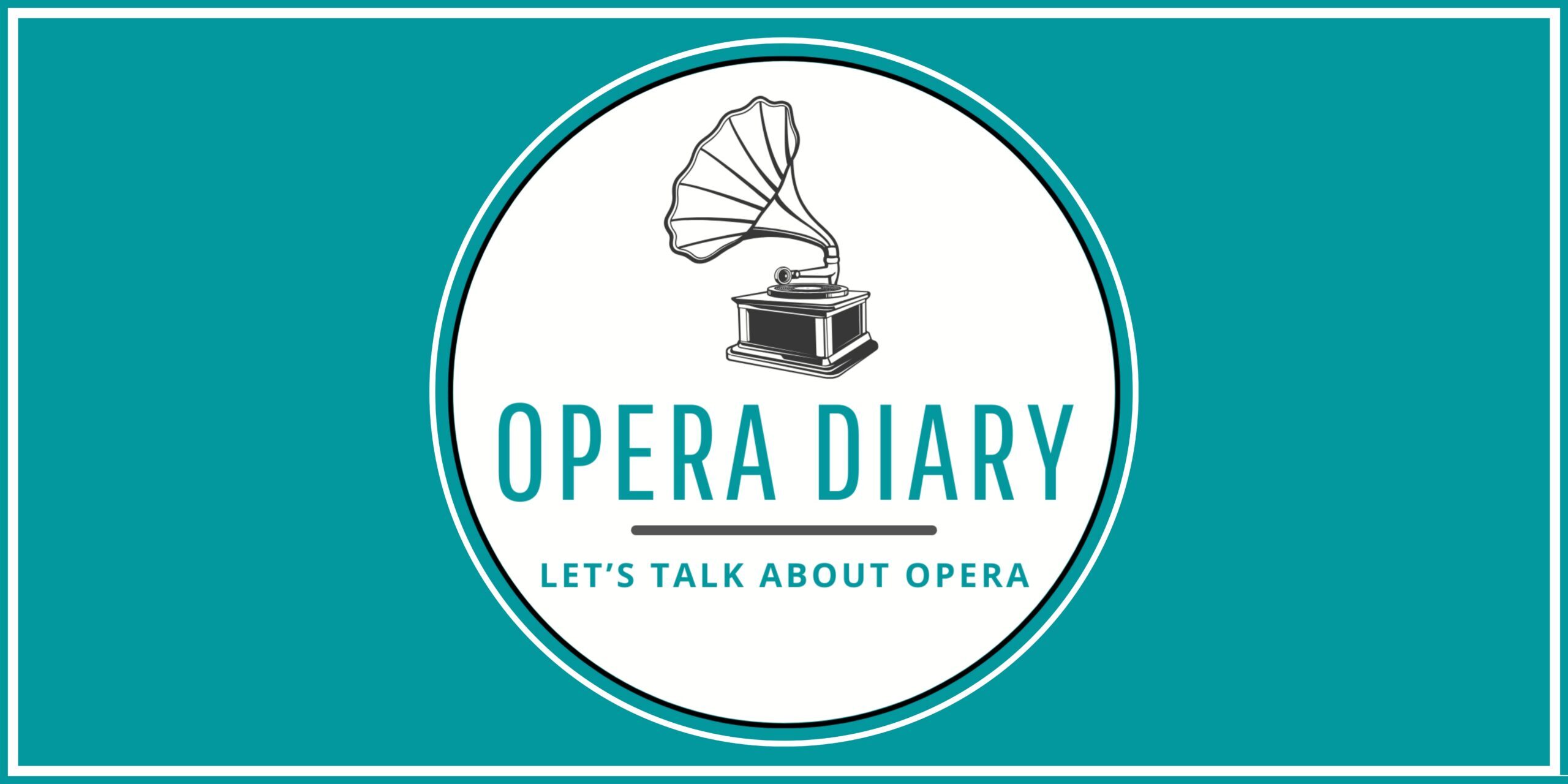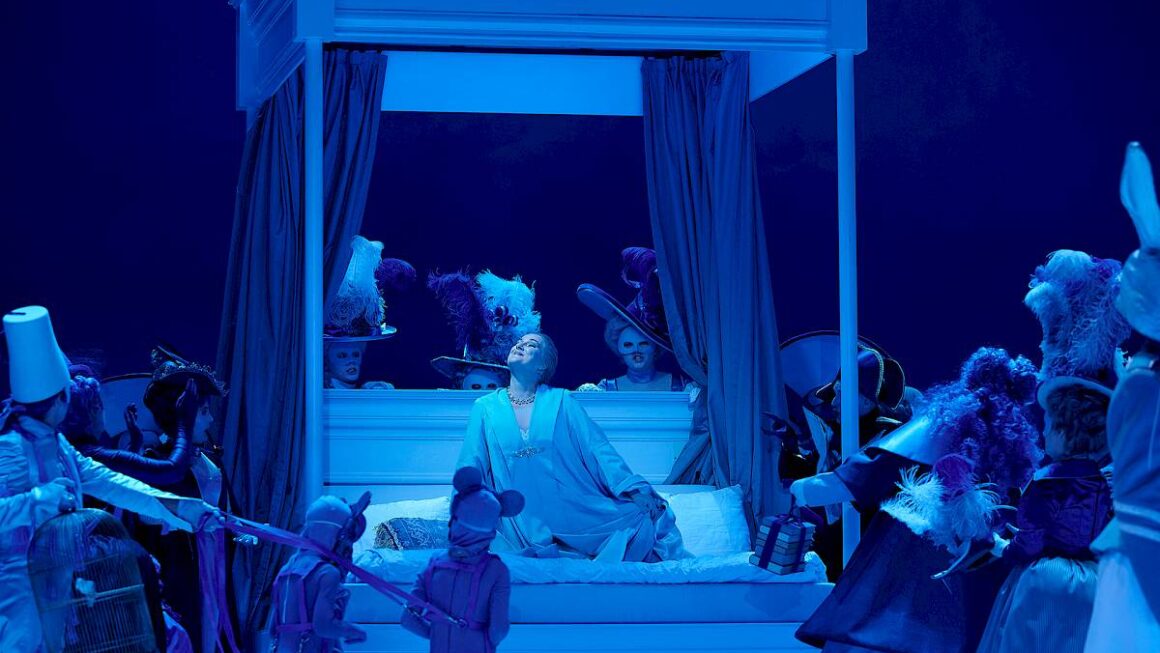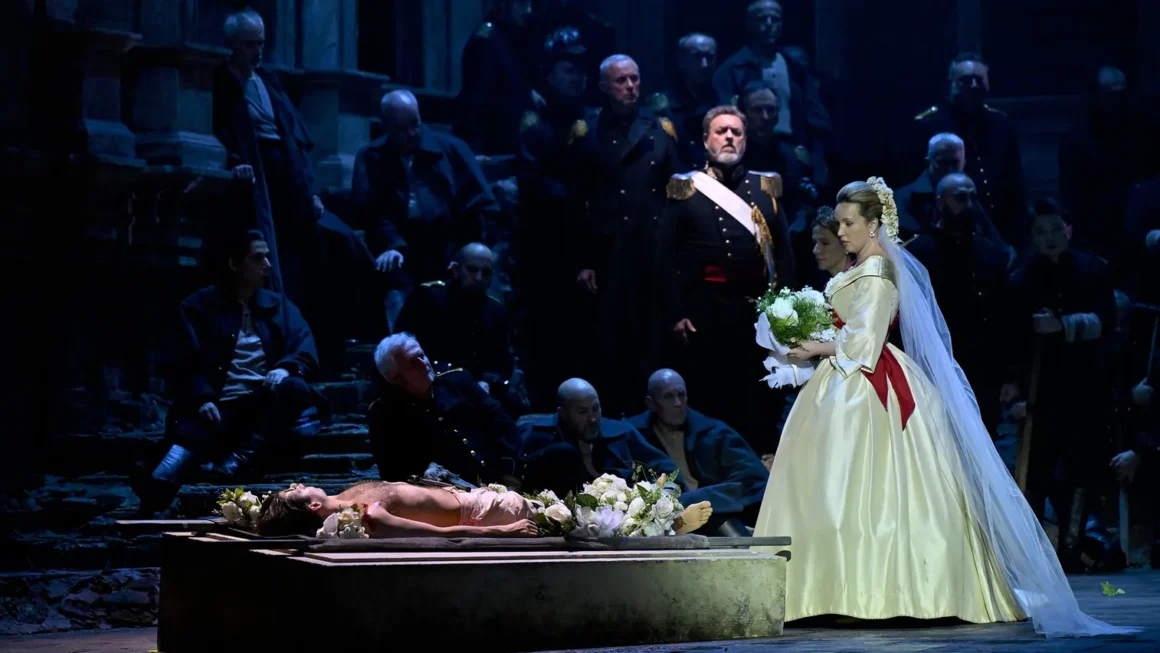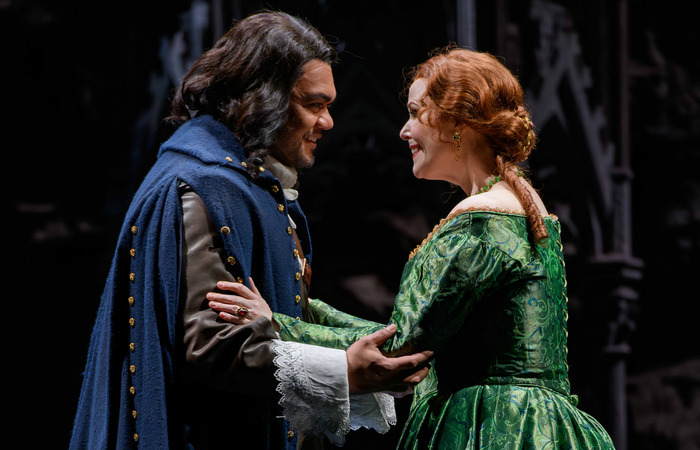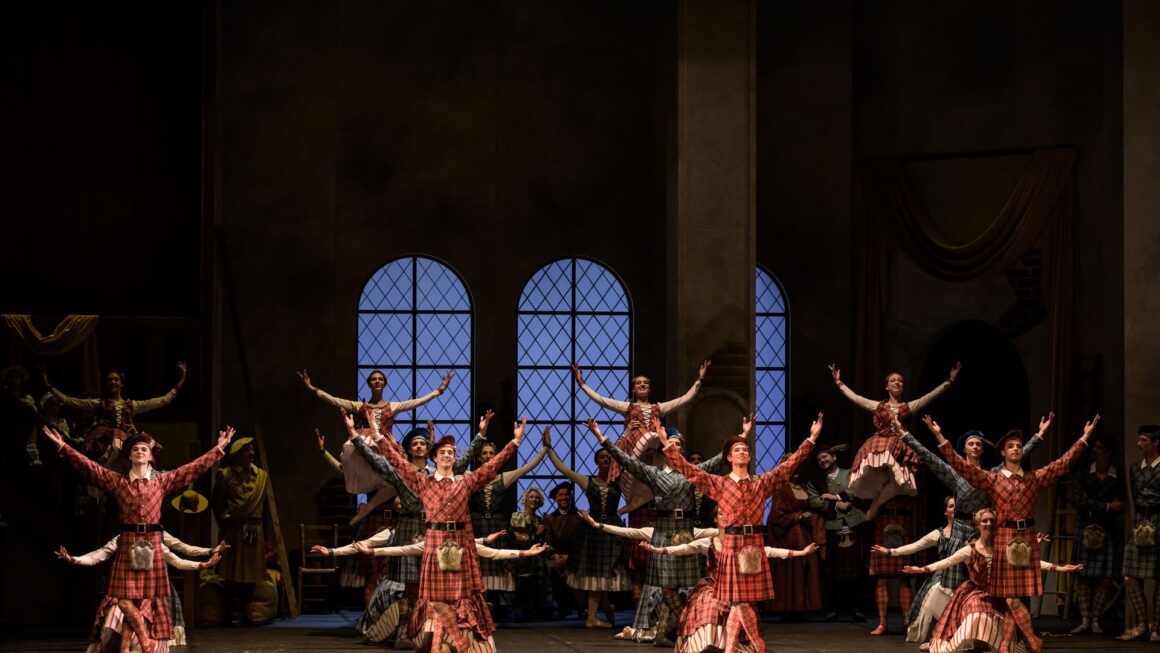Finesse and charm are words that aptly describe this new production of Der Rosenkavalier at Opernhaus Zürich. Lydia Steier’s elaborate staging emphasises the contrasts between the worlds depicted, thanks to the flamboyant work of Gottfried Helnwein. The channel chosen: colours. Starting with the ageing blue in the Marschallin’s courtyard, decorated with bright egg yellow for Ochs’ first appearance. We immediately understand that it is he who heralds the next stages. This approach is not without meaning: it is this character who drives the plot forward. In the second act, we are immersed in an environment where the predominant colour is yellow… until Ochs enters, resplendent in bright red, a colour which, according to the aesthetic logic of the production, will dominate the third act – with the exception of the Marschallin, who is always associated with the blue that heralds the afterlife. A very clever choice, in that the colours can reflect not only the mood of the main actions taking place in the act, but above all the personalities of the main characters. An effective storytelling tool, aesthetically pleasing, and subtle enough not to offend the audience’s intelligence.

At the beginning of the first act, there are no half measures: sex is clearly the subject, a pleasure shared equally between the two lovers, but avoiding vulgarity. The relationship between the Marschallin and Octavian is above all physical. Its depth will be revealed as the action unfolds, as the bond proves to be stronger than either of them believed. With Octavian, Angela Brower slips into the role of the Kavalier with great dexterity; her tone is clear, well developed and very assertive (even when her voice has to rise above the orchestral fabric firmly held by Joana Mallwitz), sometimes slightly tart in the high notes, which she reaches without the slightest difficulty. The contrast with Sophie and the Marschallin may be somewhat softened, but without creating any confusion in the registers; it even helps to reinforce the character’s jovial nature, a somewhat spoilt boyish side that is not always easy to portray on stage.
Diana Damrau portrays a Marschallin with a prodigious richness of modulation that sets her apart from other performers of the role. More belcanto than Mozartian, more youthful than decadent, more light and volatile than livid, her mischief is that of the great operetta singers, as she herself has become, where the note is coloured according to the dramatic intention of the text. There is no doubt that it is she and those around her who bring the theatrical verve of this production to its peak.
Emily Pogorelc embodies a Sophie who is not lacking in effervescence. She undergoes the events dictated by the libretto, displaying all the joys and annoyances that the character experiences, pushing the caricatural side required by the staging, which fits so well with the watercolour of characters proposed. More petulance than frank delicacy. Her full voice can be a little too assertive at times, but she is able to blend with her partners to create the moments of seraphic beauty that we expect from any Rosenkavalier, particularly in the third act.
Günther Groissböck plays an Ochs whose reputation precedes this production and is well known. He is undeniably the best performer of the role on the European stage. He has moved beyond the stage where the singer is satisfied with simply doing what is asked of him: now he is perfecting the art of being Ochs, which he is one of the few today capable of doing with such ease and success. His voice, bearing and physique all combine to bring out a character that seems to have been designed for him and his abilities. His voice is rich, ranging from cavernous low notes to the few high notes he is required to project with valour. A force of nature, in sum, who willingly and convincingly gives himself over to the extravagances of the staging.
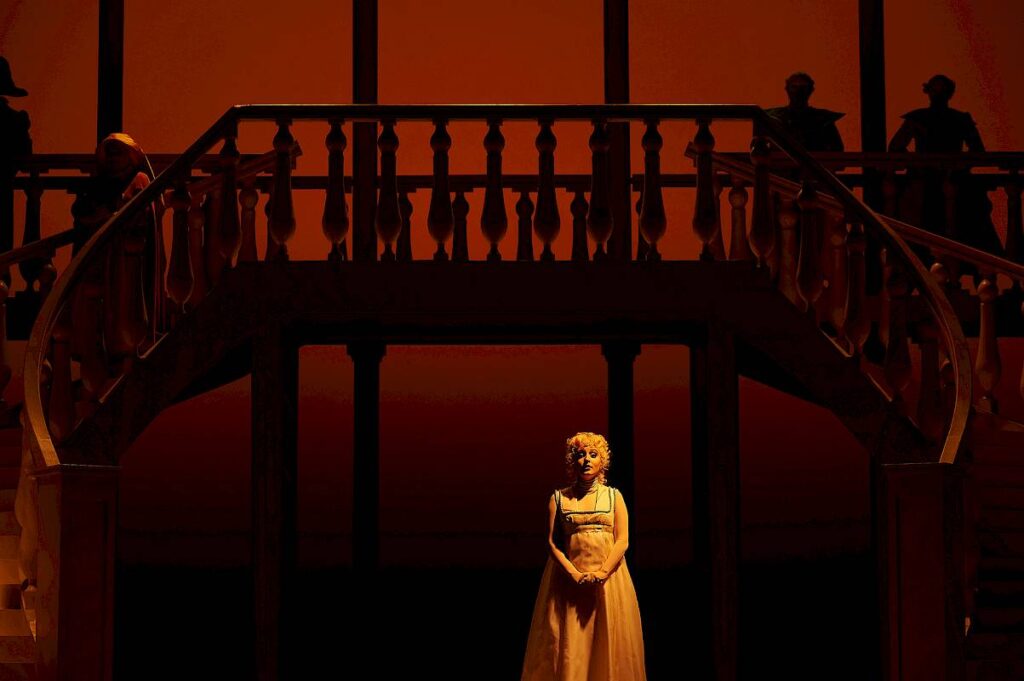
Faninal comes to life in Bo Skovhus’ deliberately old-fashioned performance, but with an elegant voice and finely crafted intonations. Nathan Haller and Irène Friedli had the challenging task of portraying Valzacchi and Annina: not only did they excel in their roles, but they also brought the essential touch of complicity to ensure the success of the duo. Dance, singing, theatricality: a combination of talents that ensured excellent moments whenever they appeared on stage. Christiane Kohl surprises in the role of Mariane Leitmetzerin: her singing is generous and silky, her voice projected with great delicacy. A graceful performance for a character often pushed to exaggeration, which makes us forget that it is she who announces the arrival of the Kavalier at the beginning of the second act.
A thunderous applause for the other excellent performers who enhanced the evening with their singing and comic talent (as well as the fabulous choir of the Chor der Oper Zürich): Stanislav Vorobyov (Polizeikommissar), Johan Krogius (Haushofmeister bei der Feldmarschallin and Wirt), Daniel Norman (Haushofmeister bei Faninal), Max Bell (Notar), Omer Kobiljak (Sänger). And, of course, Sandro Howald, whose Leopold is simply unforgettable. What a great actor: even without saying a single word, he leaves his mark on this superb production.
As for the orchestra, there is no room for boredom. The tempo is lively and astonishing, which makes the moments of delicacy and gentleness even more poignant. Joana Mallwitz’s conducting breathes symphonic life into this score, whose smallest details take you from hearty laughter to tears of the most sincere emotion. Through the quality of her conducting, but also thanks to the precision of the execution of the details and the clarity of her work, the conductor is able to bring the orchestral part to life, making it an element of the plot that helps to reinforce the feelings and words embodied on stage.
An absolute coup de cœur for this work, for this sumptuous synergy between stage, orchestra and score. It is beautiful, lively and elegant, without sacrificing the decadent character of the work… Perhaps one of the most refined and accomplished conceptions seen in recent years for this opera so so cherished by the author of this review.
:::::::::::::::::::::::::::::::::::::::::::::::::::::::::::::::::::::::::::::::::::
DER ROSENKAVALIER
Comedy for Music in three Acts by Hugo von Hofmannsthal
Music by Richard Strauss (op. 59)
Joana Mallwitz | Direction · Klaas-Jan de Groot | Chorus Master · Lydia Steier | Staging · Gottfried Helnwein | Stage and costume design · Tabatha McFadyen | Choreography · Elana Siberski | Lights · Tabea Rothfuchs and Ruth Stofer | Video
Cast: Diana Damrau | Feldmarschallin Fürstin Werdenberg · Angela Brower | Octavian · Emily Pogorelc | Sophie · Günther Groissböck | Baron Ochs auf Lerchenau · Bo Skovhus | Herr von Faninal · Irène Friedli | Annina · Nathan Haller | Valzacchi · Omer Kobiljak | An Italian singer · Christiane Kohl | Marianne Leitmetzerin · Stanislav Vorobyov | A police inspector · Max Bell | A notary · Johan Krogius | The Marschallin’s Major-Domo · Daniel Norman | The Faninal’s Major-Domo · Johan Krogius | An innkeeper · Sandro Howald | Leopold · Orchester der Oper Zürich · Chor der Oper Zürich.
(For further informations) Link to the Opernhaus Zürich website: Der Rosenkavalier
